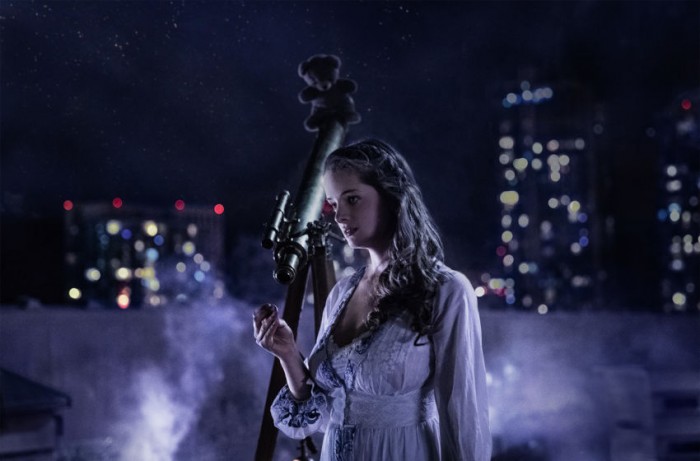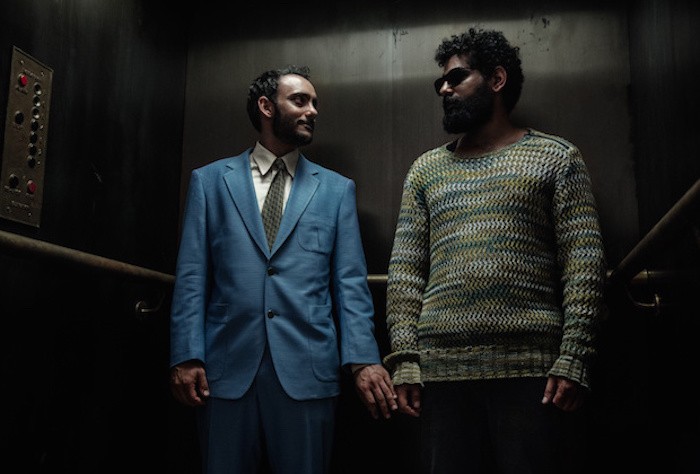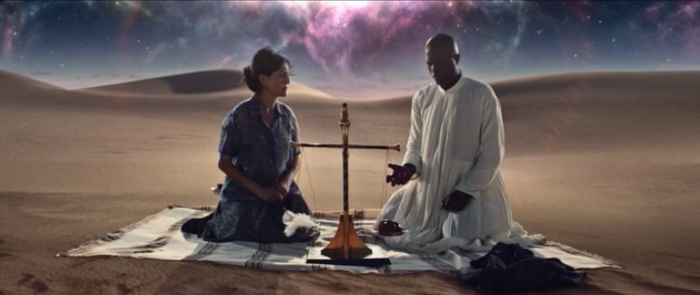'American Gods' Review: Bow Before Shadow Moon In 'Head Full Of Snow'
(Each week, we'll kick off our discussion of American Gods by answering one simple question: which character do we worship this week?)
The fire and brimstone of last week's introductions to Anansi and Czernobog was absent in "Head Full of Snow," but what we lacked in impassioned speeches, we gained in methodical insight into the state of the old gods and Shadow's continued agnosticism and apprehension to accept what he is seeing as truth.
Who Do We Worship this week? Shadow Moon
Between Annubis, Zorya Polunchnyaya, the Ifrit, and our old friend Czernobog, we had a world class buffet of mythological heavy hitters to choose from, but this week, our praise goes to the mere mortal, Shadow Moon (Ricky Whittle). After episode two left our protagonist gambling his life away to a brain-bashing, chain-smoking, slavic deity, our once fatalist lead set aside his apathy and started participating in his new life instead of just being a dog on Mr. Wednesday's leash.
Zorya Polunchnyaya, played by Polish actress Erika Kaar, took Shadow to the roof and appealed to the softer side of him, the side that is affectionately nicknamed Puppy and likes marshmallows in his hot cocoa. All Shadow craved in prison was to return to a quiet life with his wife, and yet, the closest thing to affection that Shadow has received so far has been the ravings and revenge-fueled come-on of his best friend's widow. Then Zorya Polunchnyaya kisses him gently and literally gives him the moon. She looks into his eyes and wills him to not lose this protection. When he wakes up on the couch, refreshed, with the moon (coin) in his pocket, he goes back to Czernobog and gets a rematch to prolong his death sentence, in a scene that plays out like many mythological hero stories do: with an ambitious and determined man poking the ego of a god and entering a game of braun or wits. With an appeal to his humanity and a win against Czernobog, this new Shadow goes on to make it snow.
Shadow went from a man falling apart at the seams after his meeting with Media in last week's episode to being able to clear his mind enough to will the weather to change. Although this act raises more questions for Shadow, and more confusion about his black and white views of everything either being fantasy or reality, these events have started pushing him into the grey area where fantasy and reality are one in the same.
Where Are They Now?
Unlike the first two episodes, flashy new gods were no where to be seen: no faceless goons or TV legends in sight. Instead, "Head Full of Snow" gave us a deeper look beyond the curtain of what has become of the old gods in this new country. There's Mr. Wednesday reminding Zorya Vechernyaya (Cloris Leachman) of her youth, draped in pearls and adored by her people, as she sat in her rundown ashtray of a Chicago apartment that she shares with her two sisters and Czernobog, and the Jinn, lamenting about not being understood while he drives his Taxi, as he has done for the last ten years.
These old gods have been essentially fired from their jobs and put into a permanent state of welfare. Zorya Polunochnyaya explains to Shadow how she and her sisters spend all day watching the sky in order to keep away a world-ending evil, and yet Shadow, like most people watching or reading American Gods, has no idea who she was. Prior to reading American Gods long before this show was made, I did not know what a Jinn was, or that an Ifrit is a type of Jinn with eyes of fire that does not grant wishes, and I am sure that I am not the only one. We see Mad Sweeney, a leprechaun that can pull gold out of thin air, down on his luck and suffering from alcoholism.
However, in this bleak America where gods are protecting people who barely even remember them, Mr. Wednesday clues us in that white Jesus is actually doing quite well for himself. Fervor and passion are the life blood of the gods, but that doesn't mean that only the new gods are being fed. In a country where immigrants and refugees feel pressure to acclimate, the gods that they brought with them were abandoned for christian America. Jesus in America is a franchise (with many different versions), but these gods are mom and pop shops, struggling to stay open. This is "God's Country" not "Gods Country."
I Do Not Grant Wishes
In the second "Somewhere in America" sequence for this episode, we meet the meek and mild Salim (Omid Abtahi), already down on his luck, trying to make it his first week in America selling "shit." The meeting between Salim and the Ifrit, or The Jinn (Mousa Kraish), was one of the more memorable 'Somewhere in America' sequences in the book, and much like Bilquis and her man-eating ways, I was curious as to how this scene would be properly adapted visually. In a book that was published pre-9/11, the Salim and Ifrit story is one featuring an LGBTQ love scene between two Arab men, a connection not often seen in today's media.
Fortunately, like Bilquis, the scene is handled with such care and intimacy that the audience feels like they are intruding on something far more meaningful than any typical sex or love-making scene. Where Neil Gaiman beautifully articulated the feelings of Salim receiving the fire from the Ifrit, Fuller, Green, and Slade showed it to us, taking us into the desert where these two impassioned men became something otherworldly. If handled poorly, the switch from reality to fantasy in this scene could have felt tacky or caused the audience to remove themselves from the moment, but it was in the proper hands: this moment felt pure, and much like Annubis in the opening scene of this episode, it showed a side to middle eastern mythology that is not normally emphasized. It's a side we certainly don't see in the news or in the anglo-centric casts of Hollywood (I'm looking at you, Gods of Egypt).
There were no magic lamps or mummy curses, no plagues or horror tropes, no terrorism. The show managed to deliver a religious experience that most viewers would be otherwise unfamiliar with. With a softer Annubis gracefully escorting the recently deceased to the desert beyond and weighing her heart against the feather of truth, the show allowed us to see the religion beyond the myth that has been co-opted so much into horror and science fiction. It is another opportunity for American Gods to teach a history and humanities class under the guise of good old fashioned entertainment.
Fantasia 2017
Brian Reitzell's musical score has acted as its own entity and character in all three episodes of American Gods so far. However, this episode in particular brought up feelings of Fantasia, albeit grittier and with more uses of the c-word. The score lends itself as a second storyteller. If you removed all dialogue from this episode you would still know every character, relationship, and feeling. The score never tries to hide, or merely provide background noise to each scene. Instead, we get to know the characters through the instruments that play them. When we first see Czernobog in this episode, our ears are greeted with long and low notes on a bass, a drastic change from the light and airy chimes of Zorya Polunchnyaya. Without any words spoken, you can dissect each character's nature.
The show doesn't shy away from boosting the setting and score up to eleven. It would be easy to just show Salim sitting in a waiting room and watching the clock tick by, but this is a man who came all the way to America to start a new life and this isn't just seconds and minutes and hours passing him by – it's his opportunity being wasted. It's his new life slipping further away. How can they emphasize that? By turning the wall behind him into a giant clock and setting it to a score that lacks any urgency or optimism, which is paralleled later by the intense and passionate rhythmic score of his encounter in the hotel room.
Adaptation Notes
We're going to talk book spoilers now. If you haven't read the novel, you'll want to stop right here.
With Czernobog on board and Laura Moon sitting on Shadow's bed in the final scene of this episode, the show made great strides in the plot, and we can expect that the next stop is the House on the Rock. However, the preview scenes for episode four indicate that most, if not all, of the episode will be fleshing out the story of Laura Moon and her journey to and from the grave. Learning more about her story could answer the question raised in episode one about who slaughtered all of Technical Boy's goons to save Shadow, but it looks to primarily be an expository episode to help us get to know Shadow better, before taking a much bigger leap into the world of the gods and finding out Mr. Wednesday's real identity and what the hell is going on.



